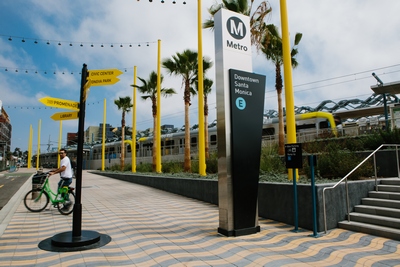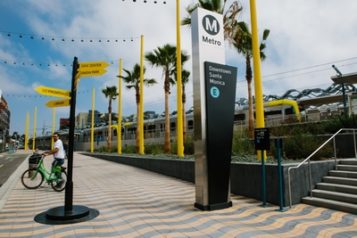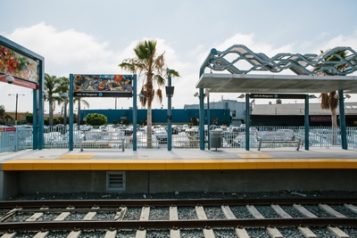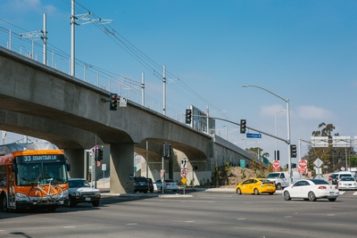
LOS ANGELES, Calif. – Skanska’s project, the Expo Line Phase 2 Extension, located in Los Angeles, California, has received Envision Platinum certification from the Institute for Sustainable Infrastructure. It is the first transit project to receive the certification, as well as Skanska’s first Envision-certified project. Additionally, at more than $700 million, it is the largest project by contract value to achieve the certification.
Much like LEED for building construction, Envision is a groundbreaking resource for professionals involved in planning, designing, building and maintaining civil infrastructure. The system provides a holistic framework for evaluating and rating the community, environmental and economic benefits of all types and sizes of infrastructure projects. Administered by ISI, Envision consists of a broad range of criteria that address a project’s impact on the surrounding community and environment, technical considerations regarding materials and processes, and other critical choices spanning the project’s lifecycle.
“This is a significant milestone for every stakeholder involved in this project,” said Skanska USA Chief Sustainability Officer Elizabeth Heider. “As the global green community converges in Los Angeles for Greenbuild, Expo 2’s Envision certification shows that, no matter what you’re building, it can be built green. The potential to combine well-accepted green standards like LEED for buildings with Envision’s rubric for infrastructure opens the door to district-level green planning like never before.”
Completed by the Skanska-Steve P. Rados Construction joint venture last spring, the Expo Line extension extends LA Metro light rail service from Culver City to Santa Monica, ultimately connecting downtown LA to the Pacific beaches. The project received points toward its certification based on measures taken to improve quality of life surrounding the project, leadership in long-term sustainability planning, material usage and existing environment considerations. Some specific highlights included recognition for local hiring of craft labor, sourcing regional materials to the highest standards of the Envision program and for integrating the new line with other means of transit from bus systems to bike paths.





 Join our thriving community of 70,000+ superintendents and trade professionals on LinkedIn!
Join our thriving community of 70,000+ superintendents and trade professionals on LinkedIn! Search our job board for your next opportunity, or post an opening within your company.
Search our job board for your next opportunity, or post an opening within your company. Subscribe to our monthly
Construction Superintendent eNewsletter and stay current.
Subscribe to our monthly
Construction Superintendent eNewsletter and stay current.